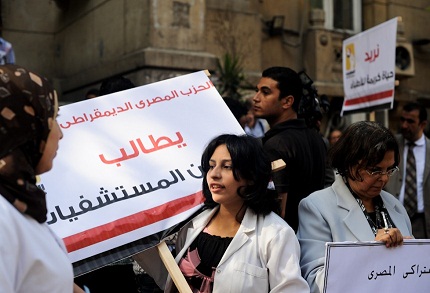
Doctors have agreed on a set of new measures to take as part of their partial strike which has gone on for over 45 days.
In a meeting yesterday the committee governing the partial doctor’s strike said they intend to escalate the strike against the Ministry of Health, which they said has, “ignored the demands of the doctors for more than a month and a half.”
Their latest method of escalation is to gather signatures demanding the dismissal of the minister of health and three of his aides. In addition, they plan to hold a sit-in next month in which the younger doctors will participate. The residents and specialists who support the strike will not participate because their absence from hospitals might make it easier to break the strike.
The striking doctors have already engaged in several marches, including one at the health ministry and a march in Downtown Cairo where a symbolic funeral for health was observed.
The doctors’ strike, which started in 1 October, gives free treatment to patients at public hospitals. It does not disrupt treatment but it allows patients to be treated at emergency departments instead of the outpatient clinics, where they would be charged. The intention is to make the health ministry lose money and put pressure on the administration. The doctors on strike have faced resistance from the administration and doctors inside the hospitals, who benefit from the outpatient clinics.
The doctors say they are aware that they may have to continue the strike for a long time, citing examples of other countries where doctors were on partial strike for months, such as Germany and Israel.
The committee has agreed that a full strike is not an option even though some doctors have called for more dramatic action after feeling provoked by how quickly the authorities responded to the Metro workers’ strike.
The committee added that a full strike may lead to the closure of some hospitals, which may harm some patients and render the strike unprotected by international treaties “and would be punishable by law.”
Nadia Younis, Deputy Head of the Obstetrics and Gynaecology Department at the Kafr Al-Dawar General Hospital, and the coordinator of the strike there said, “some departments in hospitals and some hospitals have cancelled the free treatment for emergencies… Emergencies specifically have to be treated for free until there is health insurance for everyone.”
“The law still ensures free treatment for emergency cases,” Younis said.
Younis was investigated last week by her hospital administration, for her part in making free treatment available.
The doctors also plan to be more active in their group resignation campaign, which involves collecting resignations that they plan to hand in when the number reaches 15,000. All the doctors will hand in the same resignation form with the same reasons for resignation. Legally they can all be accepted together or rejected wholly but not partially.
The doctor’s strike intends to achieve three goals, raising the salaries of everyone who works in the health ministry, creating harsher punishments for people who commit attacks against hospitals and gradually raising the budget for health to 15 per cent of the state budget. It is currently less than five per cent.



